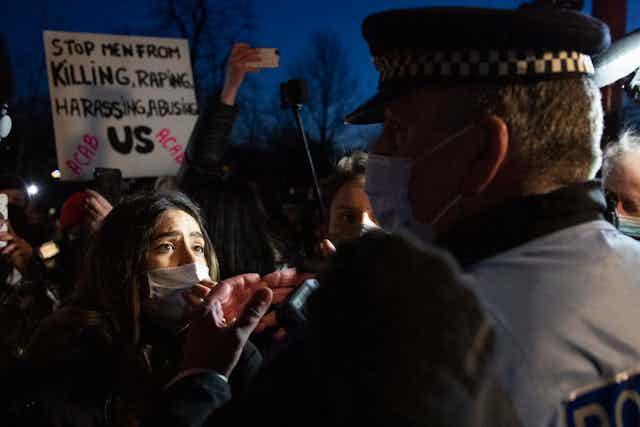As the chaotic scenes in Clapham Common in South London on March 13 show, questions about the protection of rights during the COVID-19 pandemic need urgent attention. Over the past year, parliament has paid insufficient attention to human rights. That includes the right to protest. Now, we are seeing the results.
So far in Westminster there has been little resistance to the government as it has moved to react to the pandemic, including through legislation passed quickly which is designed to control the spread of COVID-19. Although the government’s response both restricted some rights and arguably failed to protect others (including the right to life and right to health), there has also been almost no rights-based debate of its proportionality or adequacy.
Even everyday parliamentary business, such as PMQs and committee inquiries, has been almost devoid of human rights talk. Of more than 400 COVID-19 related questions asked in Prime Minister’s Questions since the end of January 2020 only three related to human rights. Of 60 committee inquiries into the pandemic, only two asked rights-related questions in their terms of reference.
Parliament and the right to protest
We have now seen the repercussions of this lack of debate around the right to protest specifically. Had there been more clarity over what is and isn’t allowed, the events in Clapham may have unfolded very differently.
The first restrictions imposed last year contained exemptions to allow socially distanced protests to go ahead. This exemption was subsequently removed, but nothing was added to the restrictions to explicitly prohibit people from gathering to protest. This produced a troubling ambiguity regarding the right to protest under the latest lockdown measures.

Ultimately it fell to the courts to determine whether, and if so when and how, protest was permitted under the current restrictions. On the Friday before the Sarah Everard vigil had been planned, the High Court confirmed that we now have an undesirable situation in which protests are not necessarily prohibited under the current restrictions. However, whether any particular protest can go ahead while lockdown persists is to be determined by the police, taking into account their assessment of the public health risk posed.
It is manifestly inappropriate for the police to be the arbiters of proportionality in these cases without clear guidance from parliament.
Legislative inattention to protest led to what seems to have been a widespread misunderstanding that protest was effectively prohibited. In other words, because the new regulations did not expressly allow protests (while it did expressly allow, for example, outdoor gatherings for Armistice Day commemorations), at least some authorities seem to have interpreted this as meaning that protest was prohibited.
Most notably there were reports of protests around the country having been cancelled or policed in ways that suggested that all protests were unlawful. They were not.
Parliament’s lack of engagement with the right to protest also meant there were no protections in place to ensure that protests and vigils like those that took place in response to the disappearance and death of Sarah Everard would be safe. Not only should parliament have intervened to prevent the removal of the protest exemption, it should also have ensured sufficient safeguards were in place to support the right to protest. These could include measures to ensure social distancing, and providing safety training to protest organisers, police and participants.
Time to act
Parliament’s failure to attend to rights protection, including the right to protest, takes place in a broader political context that is currently hostile towards rights, and particularly towards protest. This is clear from the Police, Crime, Sentencing and Courts Bill now being debated in parliament. If passed, this will create even more powers to disrupt and prevent protest, and give police further discretion to intervene in and shut down protests.
The right to protest is a cornerstone of mature democracies. As recent events have shown, failure to protect the right to protest can have damaging consequences. There is a real danger that the proposed legislation will transpose coercive and restrictive approaches to assembly, protest and togetherness from the pandemic (where they are motivated by public health concerns) to the post-pandemic era. The effect would be to limit the right to protest at all times.
It is time for parliament to emerge from its pandemic-era reluctance to engage with rights and insist on the right to protest during and after the pandemic.

